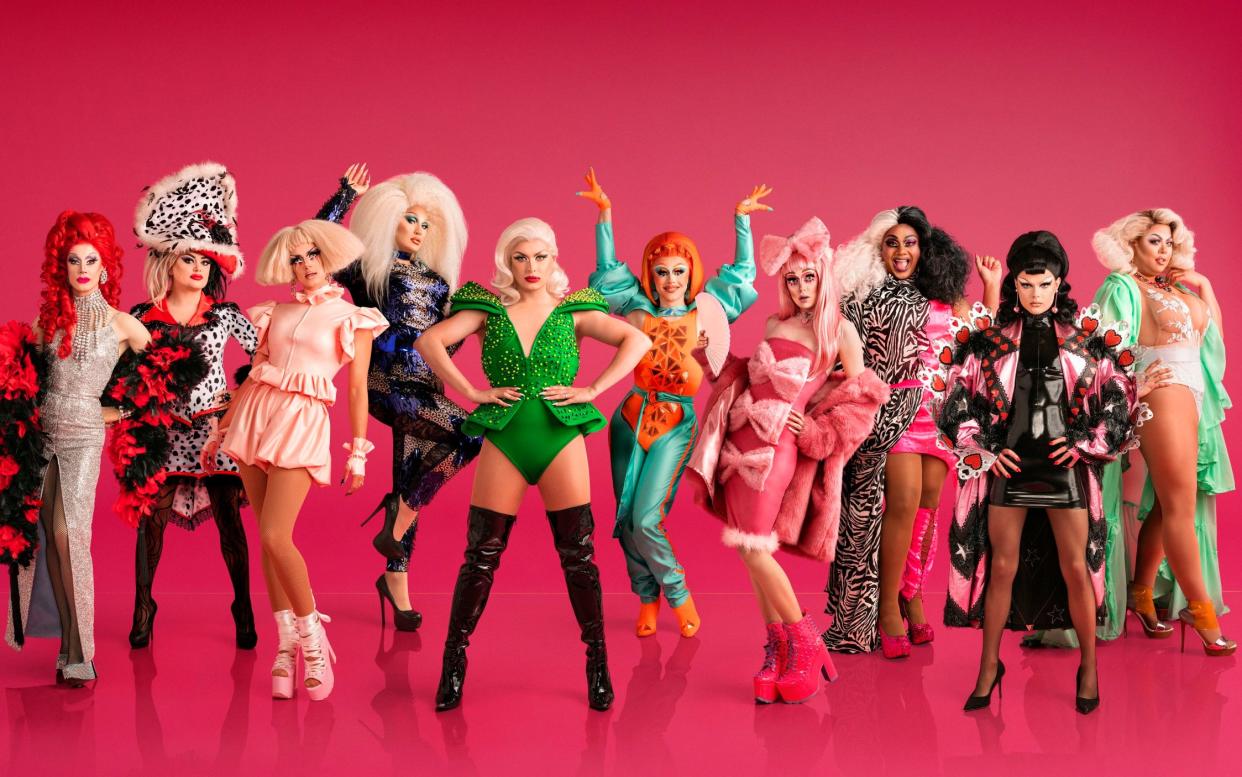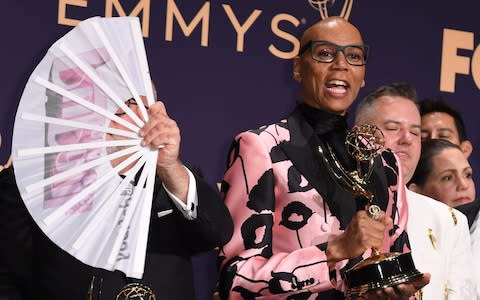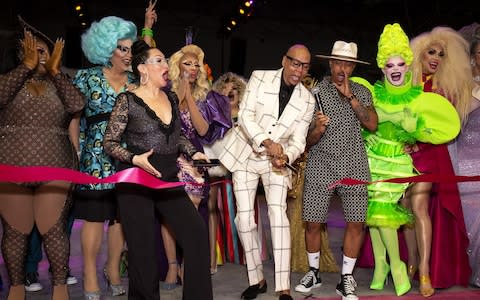Meet the men behind RuPaul’s Drag Race: 'We're bringing bawdiness back to the UK'

Are you ready for a bloke in a frock named Baga Chipz? Of course you are. We all are. Drag queens are everywhere. Drag queens are now totes norms.
If you need someone to blame for this situation, look no further than Fenton Bailey and Randy Barbato, the executive producers of RuPaul’s Drag Race. Their production company World of Wonder – previously responsible for screen triumphs such as The Eyes of Tammy Faye, Party Monster, Mapplethorpe: Look at the Pictures, and Monica in Black and White – specialises in prodding about in the nooks and crannies of US pop culture. Drag Race has been attracting a cult crowd since it debuted on American small screens a decade ago. Now Brits must gird their loins: RuPaul’s Drag Race UK will debut on BBC 3 on October 3.
I interviewed these two Hollywood-based drag-stags at the recent RuPaul’s Dragcon in New York City. (DragCon is the Ideal Home Exhibition of Drag, produced under the aegis of World of Wonder. The first DragCon UK will unfurl, appropriately, at Olympia, in January of next year – although events such as DragWorld have been happening in Europe since 2017). As hordes of drag queens and drag-chasers poured into the Jacob Javits Center – yes, that’s the vast hanger where Hilary Clinton found out she had lost the election to Donald Trump – we enjoyed a cuppa and a kiki (drag-speak for a chat).
The avuncular couple were bullish about the forthcoming launch of Drag Race UK and anxious to introduce the public to Cheryl Hole (Essex) and Sum Ting Wong (Brum) and, yes, Baga Chipz (London) among others. I kicked off by asking if the lads were surprised by their success, whether they had any sense, when they were making the first low-budget season back in 2009, that they were lighting the blue touch paper.
“I would love to say we had some sort of masterplan, but no,” says Fenton, who was born in Portsmouth, adding that the pair were assured of RuPaul’s potential: “When we met RuPaul in the early Eighties there was instant recognition that he was a star, and Ru felt that way too. He had absolute clarity.” Randy, the Yank, concurs: “Fenton and I used to say to each other ‘every moment that Ru is not an international star is a crime against humanity.’ We really believed it and RuPaul believed it.”

Between panto, Stanley Baxter, Dick Emery, Monty Python and Lily Savage, drag has enjoyed longstanding popularity in the UK. It’s odd, then, that it’s taken so long to bring Drag Race to the birthplace of Danny La Rue. It wasn’t, Fenton says, down to a lack of effort. “We were trying for about ten years to get a UK broadcaster on-board. But we were a sleeper hit at the beginning,” he explains. “It was a while before execs had even heard of the show - it took some Emmys.” RuPaul’s Drag Race has increasingly gained awards acclaim – 23 Emmy nominations and nine wins to date - but it took until 2015, six seasons in, to do so.
Barbato sees this as a logical progression: “It’s been like the trajectory of the show itself. We are in the 12th season and it’s bigger than it’s ever been. That’s very rare in TV. It usually happens the other way around. It makes an impact and then it withers away.”
The seemingly limitless appeal of Drag Race chimes with a broader, more historic fascination with drag queens themselves, who have been batting their lashes for millennia. The reasons why remain debated. Camille Paglia notes, “the drag queen recreates the dreamlike artifice of culture that conceals the darker mysteries of biology.”

Is drag affording us a therapeutic examination of our darkest anxieties about female nature? Fenton and Randy have a less Freudian explanation. “We’ve always thought that drag queens were bigger than any Hollywood stars,” declares Randy, adding, “They are more satisfying. They give you what you want.”
“They give you not just the stardom but also the wink,” Fenton adds. “The wink that Hollywood stars can’t afford to give, or simply won’t. When we were students at film school we would go to the Pyramid Club in the East Village and watch these acts in that tiny club and just think, ‘This art deserves a bigger stage’."
Fenton and Randy’s lionessing of drag queens over conventional performers calls to mind the films of Andy Warhol. Warhol proudly cast drag queens over real girls, “because the real girls we knew couldn’t seem to get excited about anything, and the drag queens could get excited about anything.”

We switched topics and focused on the oversized stiletto in the room: How do the UK drag queens in the new series measure up? Can they compare with the glamtastic US divas such as Miss Vanji, Sasha Velour and Eureka O’Hara?
Randy acknowledges some basic differences: “The UK has the drag pub culture thing. We found a lot more drag talkers, more comedy queens. There are not quite so many ‘look’ queens.” Look queens, for the uninitiated, are exemplified by art-drag proponents such as Ryan Burke, Violet Chachki and Kim-Chi. Their meticulous, mind-blowing artistry in the realm of hair and make-up – the creation of a “look” – soars to strange, unimagined heights and has spawned this new genre of drag.
Fenton suggests that comparisons are not terribly useful, not least because drag queens are individuals: “RuPaul says ‘you are born naked and the rest is drag,’" he points out. “Since drag is all about personal expression, it follows that every drag queen is going to be diff and unique, regardless of birthplace.”

Ru and the WOW boys expected the UK dragsters to be more emotionally guarded, as befits the British sensibility. But if anything, they say they found the opposite: “What delighted us was the vulnerability. We did not expect that from the Brits. We thought we might have to work harder to get the emotional stories which are critical to the success of the show. You get all the spectacle then you fall in love with their authenticity.”
I wondered if the UK contestants had retained a British identity, resisting the temptation to capitulate to the US black drag vernacular – snapping, throwing shade, serving realness – that dominates the US drag scene. This is a slang that has been captured by 1990 documentary Paris is Burning and channelled in Pose, Ryan Murphy’s show based on the Harlem Ball scene it captures. Does the UK have similar traditions, or have they been usurped by its fiercer opponent across the pond?
“The Brits regularly let loose with dirty jokes, and filthy double-entendres,” says Fenton. “Hello! Remember Mrs Slocombe’s pussy from Are You Being Served? Bawdiness counteracts all that middle-class respectability. Wait till you see Baga Chipz ‘flashing her tuppence.’” He reassured me that the Brit identity, most specifically that end-of-the-pier brashness, was alive and well.
“Drag loves differences and variations. Just like the US, there is whole lexicon of phrases and regional accents which are fully intact,” says Randy, emphasising that even on these shores, verbal idiosyncrasies play a huge role on Drag Race. “Watching Ru tap into the UK lingo is an important part of the show. Sometimes he needed translations. Now he is an expert and he walks around saying, ‘’ello guv'nor’ and ‘would you like a biscuit?’
RuPaul tackling British slang is a tantalising prospect, but there are deeper politics at play beneath the gags. There seems to be a current gender revolution going on, which is helping to fuel an explosive new interest in drag. We are, after all, living at a time when preconceived notions about gender are being hurled out of the window. DragCon provides good evidence of this: we are surrounded by cis-gendered women who identify as drag queens, and preteen boys and gender-neutral kids who are frocking up and preening while their mums gaze proudly on.

“Drag stands in opposition to the Trump idea of building walls and keeping people out. The drag experience is about extended arms and bringing people in,” says Fenton, suggesting politics has had an impact. The Trump bump has indeed sent many drag queens scrambling to the ramparts, and let’s not forget the drag kings: examples include Melissa McCarthy dragging up as Sean Spicer and Meryl Streep satirising Donald Trump.
We agree that drag is offering creative opportunities for activism and self-expression to people who might otherwise have been denied them. I feel compelled to remind the WOW boys that there is a darker side: many historians note that a fascination with drag and androgyny often precedes the collapse of a civilization. Examples include Ancient Greece, Rome, The Mauve Decade and The Weimar Republic. At various times in history, cosmopolitan acceptance and sophistication precedes Armageddon. Chicken or egg? Is the current explosion of drag/trans an augur of doom or the sign of a new utopia?
“A new utopia!” ejaculates Randy, adding, “It has to be. Right?
We all cross our fingers.

Simon Doonan is the author of Drag: The Complete Story, published this month by Laurence King.


